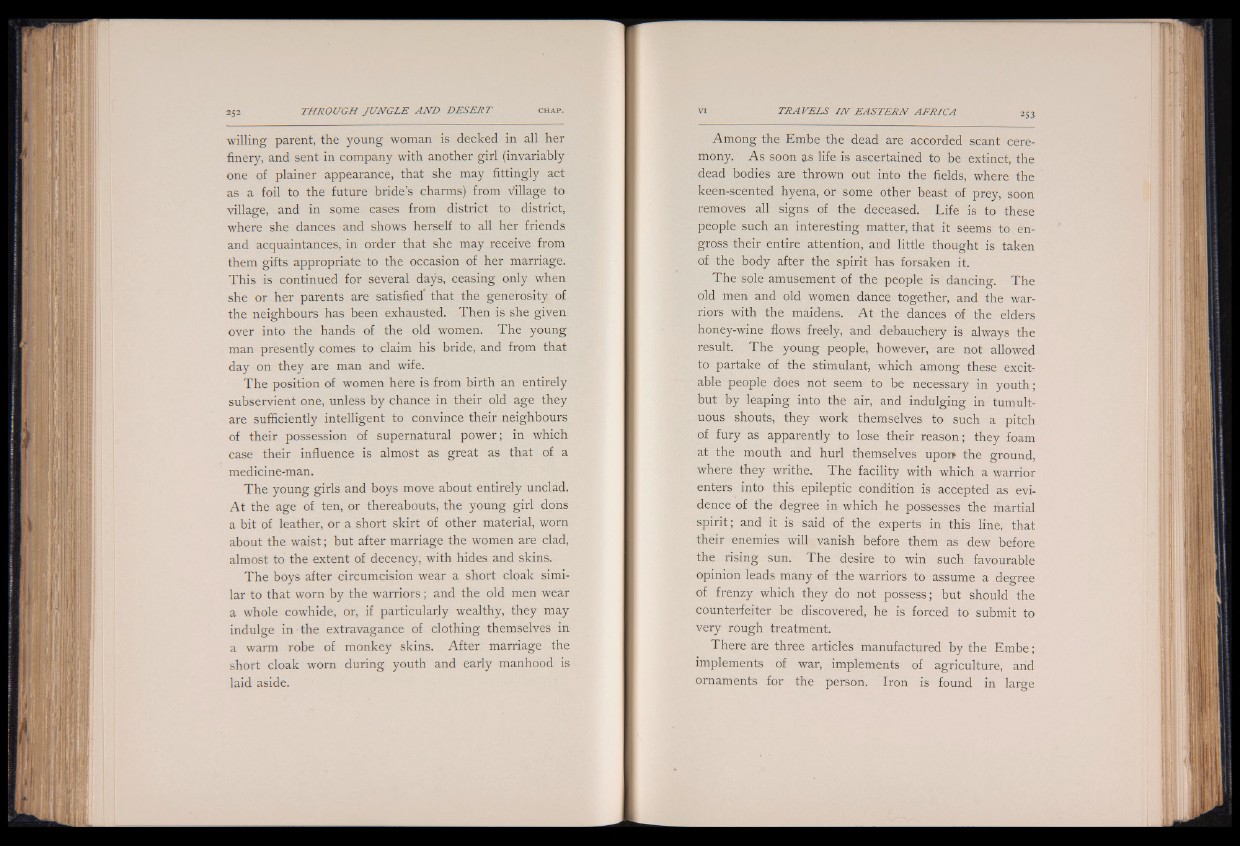
willing parent, the young woman is decked in all her
finery, and sent in company with another girl (invariably
one of plainer appearance, that she may fittingly act
as a foil to the future bride’s charms) from Village to
village, and in some cases from O ' district to district,
where she dances and shows herself to all her friends
and acquaintances, in order that she may receive from
them gifts appropriate to the occasion of her marriage.
This is continued for several days, ceasing only when
she or her parents are satisfied' that the generosity of
the neighbours has been exhausted. Then is she given
over into the hands of the old women. The young
man presently comes to claim his bride, and from that
day on they are man and wife.
The position of women here is from birth an entirely
subservient one, unless by chance in their old age they
are sufficiently intelligent to convince their neighbours
of their possession of supernatural power; in which
case their influence is almost as great as that of a
medicine-man.
The young girls and boys move about entirely unclad.
A t the age of ten, or thereabouts, the young girl dons
a bit of leather, or a short skirt of other material, worn
about the waist; but after marriage the women are clad,
almost to the extent of decency, with hides and skins.
The boys after circumcision wear a short cloak similar
to that worn by the warriors; and the old men wear
a whole cowhide, or, if particularly wealthy, they may
indulge in the extravagance of clothing themselves in
a warm robe of monkey skins. After marriage the
short cloak worn during youth and early manhood is
laid aside.
Among the Embe the dead are accorded scant ceremony.
As soon as life is ascertained to be extinct, the
dead bodies are thrown out into the fields, where the
keen-scented hyena, or some other beast of prey, soon
removes all signs of the deceased. Life is to these
people such an interesting matter, that it seems to engross
their entire attention, and little thought is taken
of the body after the spirit has forsaken it.
The sole amusement of the people is dancing. The
old men and old women dance together, and the warriors
with the maidens. A t the dances of the elders
honey-wine flows freely, and debauchery is always the
result. The young people, however, are not allowed
to partake of the stimulant, which among these excitable
people does not seem to be necessary in youth;
but by leaping into the air, and indulging in tumultuous
shouts, they work themselves to such a pitch
of fury as apparently to lose their reason; they foam
at the mouth and hurl themselves upoi> the ground,
where they writhe. The facility with which a warrior
enters into this epileptic condition is accepted as evidence
of the degree in which he possesses the martial
spirit; and it is said of the experts in this line, that
their enemies will vanish before them as dew before
the rising sun. The desire to win such favourable
opinion leads many of the warriors to assume a degree
of frenzy which they do not possess; but should the
counterfeiter be discovered, he is forced to submit to
very rough treatment.
There are three articles manufactured by the Embe;
implements of war, implements of agriculture, and
ornaments for the person. Iron is found in large